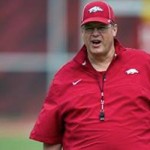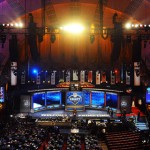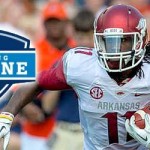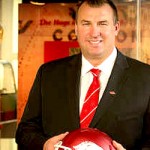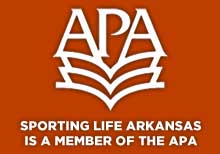
Knile Davis and Alvin Bailey turn pro.
At first glance, and based on their most recent seasons, it might seem silly — especially to fans — that Arkansas Razorback running back Knile Davis and offensive guard Alvin Bailey are foregoing a last year of eligibility at Fayetteville to pursue an NFL dream.
But their decisions shouldn’t be based on what Hog Nation might want, but rather what is in their best interest. At this point in both their careers, after spending four years on a college campus playing for free, it’s time they took advantage of the opportunity to make a dime playing football.
Or more precisely, if either can land a spot on an NFL roster, they’ll make a minimum of $400,000 a season.
Spending one more season at Fayetteville to bolster their pro prospects would be just one more fall that they didn’t get paid as they moved closer to being finished with football altogether. In a sport rare with lengthy careers, especially at running back as far as Davis is concerned, it’s better to strike while the proverbial iron is hot.
Did Davis probably cost himself hundreds of thousands of dollars with his 2012 season? Maybe. In hindsight, perhaps Davis should have made the move before last season, when he was first eligible to put his name in the NFL Draft, even if he missed the entire 2011 season with a broken ankle?
For that matter, how much did quarterback Tyler Wilson cost himself by coming back for this most train-wreck of a season?
Granted, neither player could have foretold at the time they had to make their NFL decisions known last winter that the Razorback season would run off into a ditch in April. Until we all saw it collapse before our very eyes when Louisiana-Monroe showed the Hogs in Little Rock on Sept. 8, none of us could have seen that the 2012 would be a waste for Arkansas’ premier talents.
Senior receiver Cobi Hamilton still had something to prove after playing fourth fiddle to the trio of Jarius Wright, Greg Childs and Joe Adams for three seasons, before they exhausted their eligibility and moved on to the NFL. And prove it Hamilton did in a terrific season what showcased both his speed and big-play ability — while the Hogs had little else to complement him in the receiving game, especially after senior tight end Chris Gragg went down with his bothersome knee bruise.
Davis had only two games all year in which observers might have thought, “there’s the old Knile,” but one came at the very end, against LSU’s fast and highly touted defense.
Pro scouts will drool, as everyone else has, on Davis’ strength (the regular 400-plus pounds of bench press) and speed (sub 4.4 clockings in the 40-yard dash) and just his overall “good-guy-ness.” They’ll have the same concerns everyone else has had since Davis was a prepster in Fort Bend, Texas — the apparently fragility of his bones, from the ankles to the shoulders, which sidelined him throughout his Arkansas career even at its very start, when he arrived for a spring before his high school class had graduated.
To the average fan, Bailey’s career seemed to go backward after a 2010 campaign when he and center Travis Swanson were both highly decorated freshmen and Arkansas reached the Sugar Bowl.
But how much of their success was enhanced having Demarcus Love and Ray Dominguez as veterans in the line in 2010? And how much were they affected negatively when the talent and experience around them took a dive in 2011-12?
The professional experts will be better able to ascertain all that on Davis in the NFL Combine in coming weeks. He’s been telling friends of his plan to begin a professional career after the 2012 season for a couple of years, anyway.
Would Davis and Bailey both benefit for a year under this new coaching staff? Perhaps Bailey would in blocking technique; incoming offensive line coach Sam Pittman reportedly did wonders for Tennessee in his one season there this fall after arriving from North Carolina
And certainly new head coach Bret Bielema and his offensive coordinator, Jim Chaney, know something about grooming running backs. Might Davis resurrect some of that stunning big-play ability in more than two games in 2013 under Chaney? Maybe, but Davis in one more season at Arkansas would never enjoy the numbers advantage he saw in 2010, when Ryan Mallett’s deep-ball accuracy had most teams playing two safeties deep in pass coverage to help the corners instead of jamming the line like we saw in 2012. He’d need to be in New England for that next fall.
Only in the LSU game at 2012 season’s end and in the Texas A&M contest earlier in the year did we see Davis seem to forget protecting that healing ankle with a cautious running style. But those performances ought to be enough of an indication to NFL teams that Davis possesses special talents.
Neither Davis nor Bailey needs to do it for free anymore if they don’t have to. If agents are willing to represent them, market them and prep them through all-day workouts for a pro career, then school’s out. It’s time for two talented players to go make a living.



